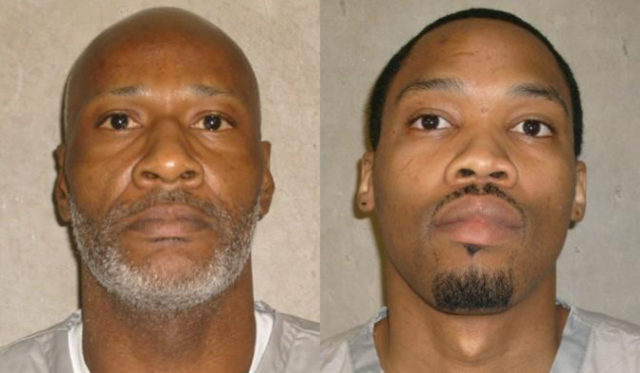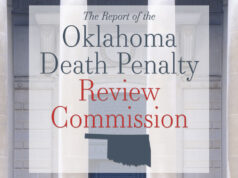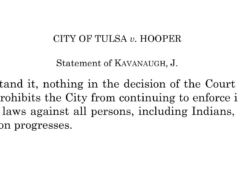

(Update: Around 2:25 p.m. Thursday, Oct. 28, the U.S. Supreme Court vacated the 10th Circuit Court of Appeals’ stay for the executions of John Marion Grant and Julius Jones. Grant’s execution was set for 4 p.m. The article below remains in its original form from Oct. 27.)
In a 2-1 decision, the U.S. 10th Circuit Court of Appeals temporarily granted John Marion Grant and Julius Jones stays of their pending executions today, stalling Oklahoma’s first attempt to carry out the death penalty in more than six years. Three other death-row inmates who were plaintiffs in the appeal did not receive stays of their executions.
Grant was set to be executed Thursday following U.S. District Judge Stephen Friot’s denial of a motion by Grant, Jones and three other inmates Monday afternoon. Jones had his clemency hearing postponed this week by the Oklahoma Pardon and Parole Board to allow pending appeals to be resolved.
Clemency hearings cannot be held without a set execution date. Grant’s clemency application was denied Oct. 5.
“The Tenth Circuit did the right thing by blocking Mr. Grant’s execution on Thursday,” Dale Baich, an attorney for the death row plaintiffs, said in a press release. “Today’s order should prevent the state from carrying out executions until the federal district court addresses the ‘credible expert criticism’ it identified in Oklahoma’s execution procedures. Those issues will be carefully reviewed by the court at the trial scheduled in February.”
Jones’ execution had been set for Nov. 18.
In overturning the district court and granting the stay, two appellate court judges — Michael Murphy and Nancy Moritz — wrote in their court order that Grant and Jones should be allowed to make the same challenges as other plaintiffs in a pending lawsuit challenging Oklahoma’s execution protocols:
The only real difference between those plaintiffs who survived summary judgment to go to trial and these Appellants, who lost on summary judgment and now face imminent execution, was that the other plaintiffs complied with the district court’s instruction to supplement their interrogatory responses by specifying an execution method or methods to be used to carry out their death sentences; the supplemental responses listed the same four alternative methods as choices that were identified by all plaintiffs (…) Appellants, citing religious scruples about assisting in what they viewed as “suicide,” refused to answer the interrogatory by choosing one or more of the four alternative methods to be used in their particular case. The problem with granting summary judgment on this basis is that we find nothing in the relevant case law that specifically requires a prisoner to designate a method of execution to be used in his case by “checking a box” when the prisoner has already identified in his complaint the very same alternative methods given as choices on the form.
Oklahoma Attorney General John O’Connor’s office told Dillon Richards of KOCO that O’Connor will be appealing the decision to the U.S. Supreme Court.
Background on federal lawsuit
More than 30 death-row inmates have been plaintiffs in a federal lawsuit challenging Oklahoma’s execution protocols. Julius Jones, John Grant and three other men — Donald Grant, Gilbert Ray Postelle and Wade Greenly Lay — had been dismissed from the lawsuit in August but were reinstated Oct. 16. A district court judge denied a requested stay in execution for the five men Tuesday. The trial in that broader lawsuit is set to begin Feb. 28, 2022.
“The public interest favors a stay, so that all the plaintiffs with identical claims in this matter are treated equitably by the courts,” the judges wrote in staying the executions of John Grant and Jones.
It was not immediately clear why the other three appellants were not granted stays in their executions. Lay is scheduled to be executed Jan. 6, Donald Grant is scheduled to be executed Jan. 27 and Postelle is scheduled to be executed Feb. 17.
The five men were dropped from the lawsuit in August after declining to pick an alternative method for their own executions, citing moral and religious barriers against “being complicit in their own deaths in a way that they believe would be akin to suicide or assisting suicide,” according to a motion filed the plaintiffs, known as The Religious Objector Plaintiffs.
“None of the plaintiffs, including appellants, have ever withdrawn that allegation or withdrawn these methods from consideration,” Wednesday’s order reads. “But the defendants propounded an interrogatory asking each individual plaintiff to further identify which of these alternative methods he proffered for use in executing him.”
Chief Judge Timothy Tymkovich issued a dissenting opinion in the decision Wednesday, arguing that the plaintiffs must select an alternative form of execution to have grounds for their lawsuit.
(Update: This article was updated at 6:06 p.m. Wednesday, Oct. 27, to note O’Connor’s planned appeal to the U.S. Supreme Court.)




















